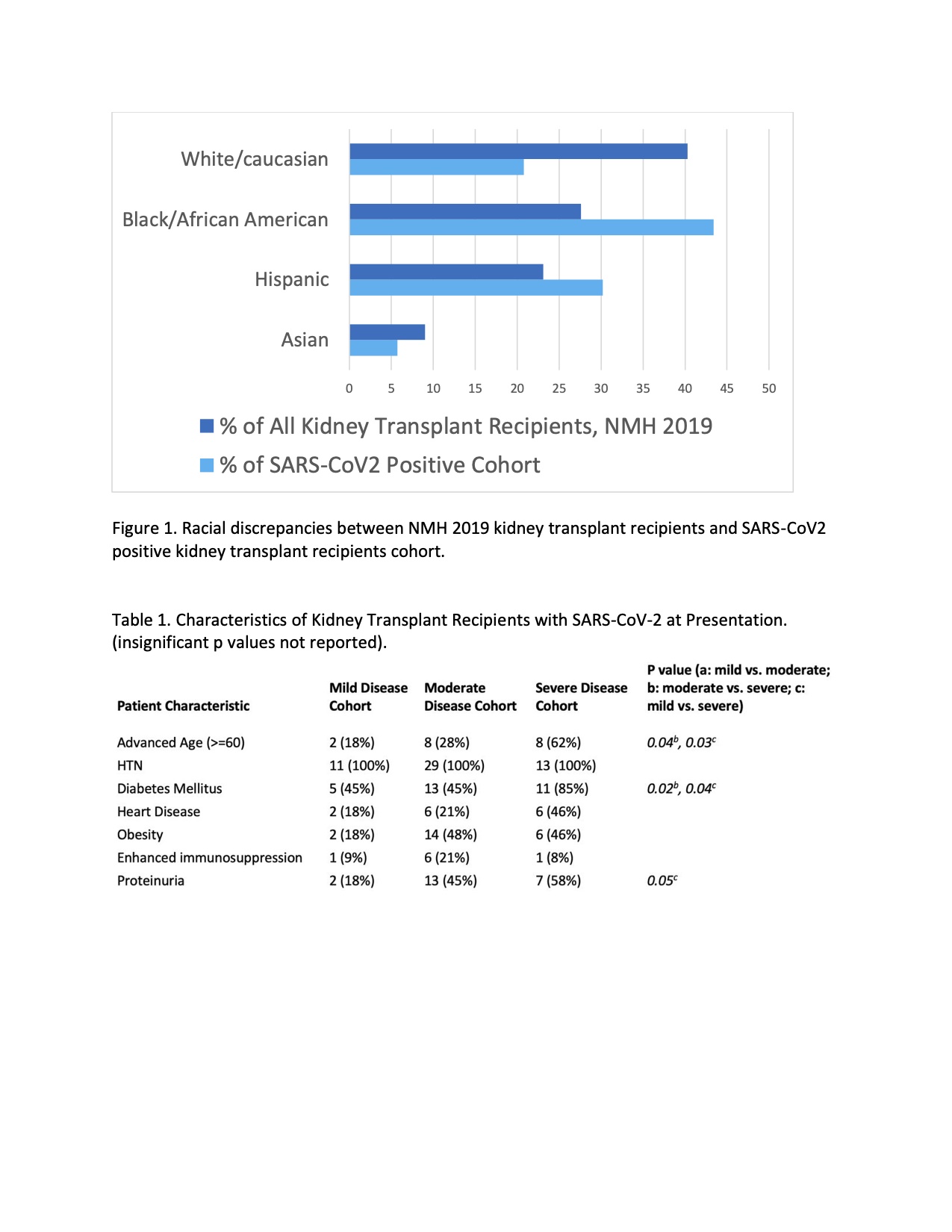Characterizing Kidney Transplant Recipients with SARS-CoV-2: An Academic Single Center Experience
S. Nahi, A. Shetty, S. Tanna, J. Leventhal
Northwestern University, Chicago, IL
Meeting: 2021 American Transplant Congress
Abstract number: 62
Keywords: African-American, Hypertension, Immunosuppression, Kidney transplantation
Topic: Clinical Science » Infectious Disease » Kidney Infectious Non-Polyoma & Non-Viral Hepatitis
Session Information
Session Name: COVID-19 in Kidney Recipients
Session Type: Rapid Fire Oral Abstract
Date: Saturday, June 5, 2021
Session Time: 6:00pm-7:00pm
 Presentation Time: 6:15pm-6:20pm
Presentation Time: 6:15pm-6:20pm
Location: Virtual
*Purpose: Kidney transplant (KTx) recipients are a unique cohort in regard to SARS-CoV-2 susceptibility and clinical course, owing to their immunosuppressed state and propensity for kidney injury. This study investigated and characterized 53 SARS-CoV-2 positive KTx pts at Northwestern Memorial Hospital (NMH) in the first six months of the SARS-CoV-2 pandemic. We sought to identify risk factors and prognostic factors for severity of clinical disease, specific to this population.
*Methods: This retrospective, single-center study included KTx recipients with a positive SARS-CoV-2 PCR at NMH from Jan. 1, 2020 to June 30, 2020. 53 pts met inclusion criteria. Clinical disease severity was ranked according to the WHO Ordinal Scale for SARS-CoV-2 Clinical Improvement, and the study population was divided into three groups based on disease severity {mild disease (ordinal scale of 0-2): n=11, moderate disease (ordinal scale of 3-4): n=29, severe disease (ordinal scale of 5-8): n=13}. We used a chi-squared analysis and a Welch’s T-test to assess differences.
*Results: Black American pts were overrepresented in the SARS-CoV 2 positive cohort, as compared to rates of KTx at NMH (p=0.025) (Figure 1). Hispanic pts were also overrepresented. In the total pt cohort, prevalence of risk factors are as follows: HTN (100%), diabetes (55%), obesity (42%),age ≥60 years) (34%), and heart disease (26%). The severe clinical disease cohort had statistically elevated rates of advanced age and diabetes. Proteinuria was identified in 42% of pts, significantly higher in the severe disease cohort as compared to mild disease (p=0.05). Enhanced immunosuppression (IS), defined by KTx or rejection episode in the last yr, was only present in 15% of cases, and not correlated with disease severity (Table 1). Fatality rate of this total pt cohort at 90 days post infection was 7.5%.
*Conclusions: This single center experience reports disparity between the representation of racial minorities in the overall transplant pt group, and their representation in the SARS-CoV-2 infected transplant pt group (Figure 1). This finding is consistent with reports of overall of higher representation of Black Americans and Hispanic Americans in total SARS-CoV-2 cases and severity of illness. This study demonstrates risk factors previously correlated with severe disease do apply to the KTx recipient cohort as well. As a potential prognostic indicator of disease severity, these data support further investigation into the use of proteinuria. Importantly, this study reports no evidence of enhanced IS worsening clinical outcomes.
To cite this abstract in AMA style:
Nahi S, Shetty A, Tanna S, Leventhal J. Characterizing Kidney Transplant Recipients with SARS-CoV-2: An Academic Single Center Experience [abstract]. Am J Transplant. 2021; 21 (suppl 3). https://atcmeetingabstracts.com/abstract/characterizing-kidney-transplant-recipients-with-sars-cov-2-an-academic-single-center-experience/. Accessed February 27, 2026.« Back to 2021 American Transplant Congress

